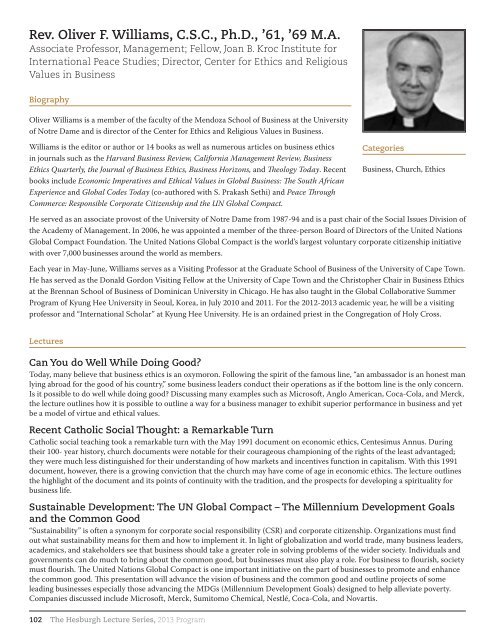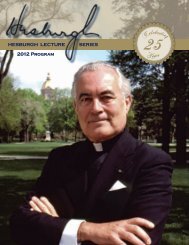HESBURGH LECTURE SERIES 2013 Program - Alumni Association ...
HESBURGH LECTURE SERIES 2013 Program - Alumni Association ...
HESBURGH LECTURE SERIES 2013 Program - Alumni Association ...
Create successful ePaper yourself
Turn your PDF publications into a flip-book with our unique Google optimized e-Paper software.
Rev. Oliver F. Williams, C.S.C., Ph.D., ’61, ’69 M.A.<br />
Associate Professor, Management; Fellow, Joan B. Kroc Institute for<br />
International Peace Studies; Director, Center for Ethics and Religious<br />
Values in Business<br />
Biography<br />
Oliver Williams is a member of the faculty of the Mendoza School of Business at the University<br />
of Notre Dame and is director of the Center for Ethics and Religious Values in Business.<br />
Williams is the editor or author or 14 books as well as numerous articles on business ethics<br />
in journals such as the Harvard Business Review, California Management Review, Business<br />
Ethics Quarterly, the Journal of Business Ethics, Business Horizons, and Theology Today. Recent<br />
books include Economic Imperatives and Ethical Values in Global Business: The South African<br />
Experience and Global Codes Today (co-authored with S. Prakash Sethi) and Peace Through<br />
Commerce: Responsible Corporate Citizenship and the UN Global Compact.<br />
He served as an associate provost of the University of Notre Dame from 1987-94 and is a past chair of the Social Issues Division of<br />
the Academy of Management. In 2006, he was appointed a member of the three-person Board of Directors of the United Nations<br />
Global Compact Foundation. The United Nations Global Compact is the world’s largest voluntary corporate citizenship initiative<br />
with over 7,000 businesses around the world as members.<br />
Each year in May-June, Williams serves as a Visiting Professor at the Graduate School of Business of the University of Cape Town.<br />
He has served as the Donald Gordon Visiting Fellow at the University of Cape Town and the Christopher Chair in Business Ethics<br />
at the Brennan School of Business of Dominican University in Chicago. He has also taught in the Global Collaborative Summer<br />
<strong>Program</strong> of Kyung Hee University in Seoul, Korea, in July 2010 and 2011. For the 2012-<strong>2013</strong> academic year, he will be a visiting<br />
professor and “International Scholar” at Kyung Hee University. He is an ordained priest in the Congregation of Holy Cross.<br />
Lectures<br />
Can You do Well While Doing Good?<br />
Today, many believe that business ethics is an oxymoron. Following the spirit of the famous line, “an ambassador is an honest man<br />
lying abroad for the good of his country,” some business leaders conduct their operations as if the bottom line is the only concern.<br />
Is it possible to do well while doing good? Discussing many examples such as Microsoft, Anglo American, Coca-Cola, and Merck,<br />
the lecture outlines how it is possible to outline a way for a business manager to exhibit superior performance in business and yet<br />
be a model of virtue and ethical values.<br />
Recent Catholic Social Thought: a Remarkable Turn<br />
Catholic social teaching took a remarkable turn with the May 1991 document on economic ethics, Centesimus Annus. During<br />
their 100- year history, church documents were notable for their courageous championing of the rights of the least advantaged;<br />
they were much less distinguished for their understanding of how markets and incentives function in capitalism. With this 1991<br />
document, however, there is a growing conviction that the church may have come of age in economic ethics. The lecture outlines<br />
the highlight of the document and its points of continuity with the tradition, and the prospects for developing a spirituality for<br />
business life.<br />
Sustainable Development: The UN Global Compact – The Millennium Development Goals<br />
and the Common Good<br />
“Sustainability” is often a synonym for corporate social responsibility (CSR) and corporate citizenship. Organizations must find<br />
out what sustainability means for them and how to implement it. In light of globalization and world trade, many business leaders,<br />
academics, and stakeholders see that business should take a greater role in solving problems of the wider society. Individuals and<br />
governments can do much to bring about the common good, but businesses must also play a role. For business to flourish, society<br />
must flourish. The United Nations Global Compact is one important initiative on the part of businesses to promote and enhance<br />
the common good. This presentation will advance the vision of business and the common good and outline projects of some<br />
leading businesses especially those advancing the MDGs (Millennium Development Goals) designed to help alleviate poverty.<br />
Companies discussed include Microsoft, Merck, Sumitomo Chemical, Nestlé, Coca-Cola, and Novartis.<br />
102 The Hesburgh Lecture Series, <strong>2013</strong> <strong>Program</strong><br />
Categories<br />
Business, Church, Ethics



